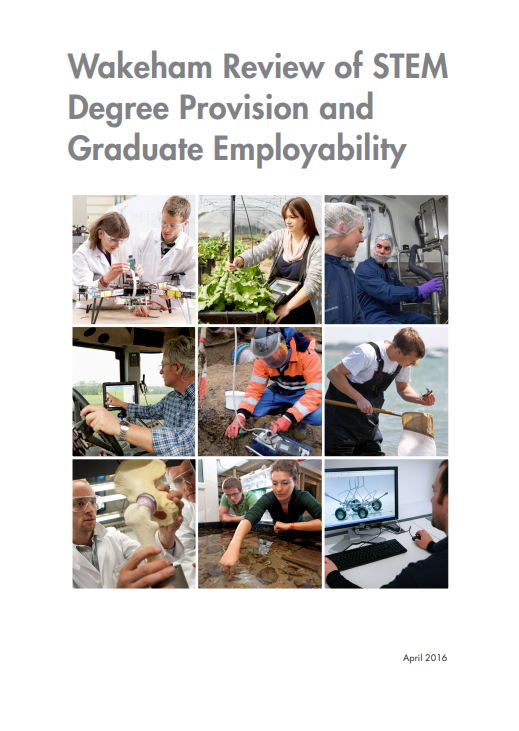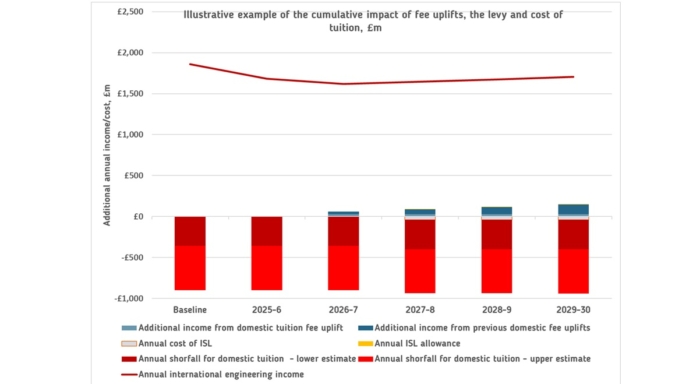The much-anticipated Wakeham and Shadbolt Reviews were published this week (16th May) alongside the Higher Education White Paper giving the sector much to chew over.
Sir William Wakeham, this year’s EPC President’s Prize recipient and newest EPC Patron, had provided a “sneak preview” of the report at our AGM in April. You can read the full report here, but the recommendations were, in summary:
Recommendation 1 – Biological Sciences
Further targeted work is needed to explore in more detail the reasons for the relatively poor employment outcomes of Biological Sciences graduates and to set out solutions for improving these outcomes.
Recommendation 2 – Earth, Marine and Environmental Sciences
Further work is needed to unpick and explore the nature of, and reasons for the relatively poor employment outcomes of graduates from Earth, Marine and Environmental Sciences (EMES) degree programmes. Where clear problems are identified for particular disciplines within the EMES group, solutions should be proposed for improving outcomes.
Recommendation 3 – Agriculture, Animal Sciences and Food Sciences
Further targeted work is needed to explore the current employment outcomes for graduates in these disciplines across the whole of the set of businesses in the agricultural food chain. The existing data is not sufficiently detailed to allow certainty about the situation now and the pace of change in the industry is likely to place new pressures on both HE and the industry to match demand with the supply of appropriately skilled graduates. The study therefore needs to include consideration of the future as well as the past.[/wptabcontent]
Recommendation 4 – Additional STEM disciplines of concern
Further targeted work is needed to explore the graduate employment outcomes of Aerospace Engineering, Biomedical Engineering and Engineering Design graduates.
Within all three disciplines the respective industry bodies, HE providers and professional bodies for those disciplines should work together to clarify the nature of their graduate employment outcomes and decide whether specific measures are required to address the concerns we have identified.
Recommendation 5 – Increased engagement between industry and HE providers
Employers and HE providers should work more closely together in order to improve graduate employment outcomes. In particular, they should consider addressing the following areas:
- Improving the opportunities for students to take up work experience and to maintain its quality
- Embedding the development of soft skills into degree courses and improving work readiness
- Better matching degree courses to employer demand for skills
- Improving STEM careers advice and awareness of job opportunities for graduates and students, as well as even earlier in the education pipeline.
Recommendation 6 – Improvements to data on graduate employment outcomes
There are opportunities to enhance the richness, quality and consistency of data available on STEM graduate employment outcomes. Ideally it should be possible for analysis of student lows from particular HE disciplines into specific sectors of employment to better recognise the type of degree and reflect upon relevant features of their degree programme. Where appropriate this should align with HESA’s existing work to review graduate destinations and outcomes data. It should also extend beyond student data collections with the ambition that information collected from employers and their representative bodies can be available for scrutiny in an accessible and comparable form.
Recommendation 7 – Accreditation
Good practice from existing, well-established systems of degree course accreditation should be highlighted and disseminated where it may be of interest to those STEM disciplines without an accreditation framework or where an accreditation framework is emerging. Potentially the Science Council should explore a future role in developing and overseeing a unified accreditation framework for the science disciplines that draws upon the experience of both the Engineering Council and those science disciplines where there are already well-established accreditation systems.
The EPC has, of course, been working for some time with a range of sector bodies to address recommendation 5 in particular. Most recently, we have been working closely with the National Centre for Universities and Business on its “engineering workwith” hub of information for employers which it plans to launch in June. Members have been very generous with their time and experience to contribute to this important project. Other projects include our Engineering Education and Employability committee’s work on good practice in provision of contextual learning (which relates to Recommendation 7) and a toolkit for development of degree apprenticeships, both of which we hope to launch soon. If you want to know more, do please get in touch.




